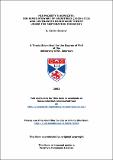His Majesty's advocate : Sir James Stewart of Goodtrees (1635-1713) and Covenanter resistance theory under the Restoration monarchy
Abstract
This thesis is the first to explore the life and political thought of Sir James
Stewart of Goodtrees (1635-1713). The first part reviews the life of his father, Sir
James Stewart of Kirk field (1608-1681) to 1661, and Goodtrees' own life from birth
to his admission to the Scots bar in 1661. This provides the backdrop of history
necessary to appreciate his contributions as both writer and radical activist.
Particular attention focuses on the conflict between Charles I and Charles II, on the
one hand, and the Church of Scotland, on the other; the National Covenant (1638)
and the Solemn League and Covenant of(1643); the British wars of religion; and
the upheavals following the Restoration in the 1660s, culminating in the Pentland
Rising of 1666.
The next part develops Goodtrees' political philosophy from his two most
important writings. Chapter 3 reviews and interprets Naphtali (1667), a defence of
those who rose at Pentland. Chapter 4 reviews Andrew Honyman's Survey of
Naphtali (1668, 1669), a rebuttal of Naphtali and standard Anglican case for royal
absolutism. Chapter 5 reviews and interprets Goodtrees' Jus Populi Vindicatum, or
The People's Right, to defend themselves and their Covenanted Religion, vindicated
(1669), his rejoinder to Honyman. His Calvinist, covenantal constitutionalism is
shown to be an important link between earlier resistance theorists like John Knox
and Samuel Rutherford and the later Whigs, represented preeminently by John
Locke.
The third part (chapters 6-7) reviews Goodtrees' life and minor writings as radical critic of the Restoration monarchy; a participant in plots among British
exiles in Holland to overthrow it; a member briefly of James's Scottish government
before the Revolution; and lord advocate and churchman pursuing political, legal,
and ecclesiastical reforms afterwards.
Type
Thesis, PhD Doctor of Philosophy
Collections
Items in the St Andrews Research Repository are protected by copyright, with all rights reserved, unless otherwise indicated.

